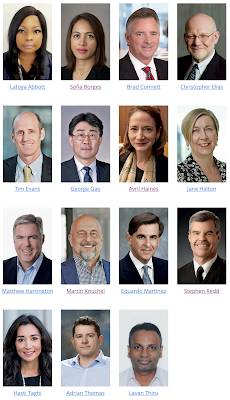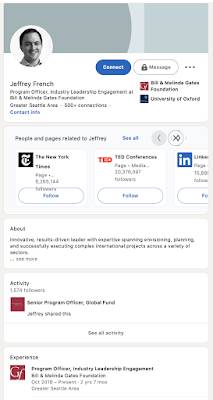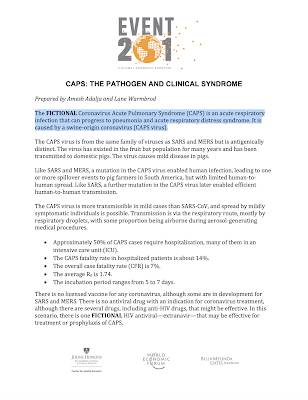
Just months before the global pandemic, a group of individuals participated in a high-level tabletop exercise called Event 201, simulating a hypothetical but scientifically possible global pandemic as shown here:
Here is a brief description of the Event 201 scenario:
"Event 201 simulates an outbreak of a novel zoonotic coronavirus transmitted from bats to pigs to people that eventually becomes efficiently transmissible from person to person, leading to a severe pandemic. The pathogen and the disease it causes are modeled largely on SARS, but it is more transmissible in the community setting by people with mild symptoms.
The disease starts in pig farms in Brazil, quietly and slowly at first, but then it starts to spread more rapidly in healthcare settings. When it starts to spread efficiently from person to person in the low-income, densely packed neighborhoods of some of the megacities in South America, the epidemic explodes. It is first exported by air travel to Portugal, the United States, and China and then to many other countries. Although at first some countries are able to control it, it continues to spread and be reintroduced, and eventually no country can maintain control."
Here is a list of the players who represent a wide range of business, government and academic backgrounds and nationalities:
In addition, the following people are members of the exercise team:
"Eric Toner, MD, is the exercise team lead from the Johns Hopkins Center for Health Security. Crystal Watson, DrPH, MPH and Tara Kirk Sell, PhD, MA are co-leads from the Johns Hopkins Center for Health Security. Ryan Morhard, JD, is the exercise lead from the World Economic Forum, and Jeffrey French is the exercise lead for the Bill and Melinda Gates Foundation.
Exercise team members are Tom Inglesby, MD; Anita Cicero, JD; Randy Larsen, USAF (retired); Caitlin Rivers, PhD, MPH; Diane Meyer, RN, MPH; Matthew Shearer, MPH; Matthew Watson; Richard Bruns, PhD; Jackie Fox; Andrea Lapp; Margaret Miller; Carol Miller; and Julia Cizek."
Here is a screen capture showing the partners involved in Event 201, noting the presence of the Bill and Melinda Gates Foundation which was represented by Jeffrey French, a program leader for the Gates Foundation as shown here:
Event 201 also received funding from the Open Philanthropy Project, which is funded by Cari Tuna and Dustin Moskovitz, a co-founder of Facebook and a billionaire worth $20.3 billion and owner of a 2 percent stake in Facebook according to Forbes
With that background, let's look at one of the issues that was discussed during Event 201. As we all are aware, since the beginning of the COVID-19 pandemic, the technology/social media sector has been very involved in eliminating any discussions that it deems are disinformation about the dangers of the COVID-19 vaccines, treatment options that do not include vaccination (i.e. hydrochloroquine, vitamin D and ivermectin), the existence of the novel coronavirus, the use of govenrment-mandated lockdowns and shutterings and any other issues that do not fit their narrative. Oddly enough, this exact issue came up during Event 201 as recorded in a transcript dated September 23, 2020, nearly one year after the exercise.
Noting that CAPS stands for the fictional Coronavirus Acute Pulmonary Syndrome as shown here:
…here are some quotes from the transcript which records the exchange between participants during the "fourth and final meeting of the Pandemic Emergency Board on December 18, 2019" with all bolds being mine:
"Tom Inglesby:
We have called this meeting today because of major strategic problems around communication that are happening globally, and here's a immediate debate that just happened on air today.
Chen Huang:
Alarming news emerging from social media companies today about the CAPS pandemic, Twitter and Facebook are reporting. They've identified and deleted a disturbing number of accounts dedicated to spreading this information about the outbreak. For more on this, we go to our correspondent: Catalina Parks.
Catalina Parks:
Chen, these accounts were created by several state-sponsored groups intending to sew political discord and some individuals are seemingly seeking to gain financial advantages. Violence against healthcare workers and minority populations has been increasing. A recent riot highlights the real danger in these posts. Countries are reacting in different ways as to how best to manage the overwhelming amounts of dis- and misinformation circulating over the Internet. In some cases, limited Internet shutdowns are being implemented to quell panic….
Kevin McAleese:
To me, it is clear countries need to make strong efforts to manage both mis- and disinformation. We know social media companies are working around the clock to combat these disinflation campaigns. The task of identifying every bad actor is immense. Experts agree that new disinformation campaigns are being generated every day. This is a huge problem that's going to keep us from ending the pandemic and might even lead to the fall of governments, as we saw in the Arab spring. If the solution means controlling and reducing access to information, I think it's the right choice….
Dr. Sell:
Polls have shown that mis- and disinformation are ubiquitous: at least 90% of the public has been exposed to these messages. At the same time, misinformation messages come from a variety of sources, even government officials, and often governments are contradicting one another. We know that social media is now the primary way that many people get their news, so interruptions to these platforms could curb the spread of misinformation, but could also limit access to information from legitimate sources.
Dr. Sell:
Health ministries around the world are attempting to combat mis- and disinformation by amplifying public health messaging through social and traditional media, but they are being outpaced by false and misleading information. National governments are considering, or have already implemented, a range of interventions to combat misinformation. Some governments have taken control of national access to the Internet. Others are censoring websites and social media content and a small number have shut down internet access completely to prevent the spread of misinformation. Penalties have been put in place for spreading harmful falsehoods, including arrests.
Dr. Sell:
Other countries have taken a more moderate approach and have focused on promoting fact-checking efforts and working with traditional media outlets. Yet, these approaches are limited in scope. Social media companies report that they're doing all they can to limit the use of their platforms for nefarious or misleading purposes. But this is a technically difficult problem and false misleading, or half true information, is difficult to sort without limiting potentially true messages. The bottom line is that members of the public no longer know who to trust. Both the misinformation and the measures to control it have led to a crisis of confidence….
Martin Knuchel:
Thank you. I fully agree that this is pure crisis communication and crisis communication today, also social media is part of it. And just to limit or even stop social media would create a huge damage. We should use it; we should get it on our side; we should work together with them and we should try to avoid this misinformation….
Tom Inglesby:
In this case, do you think governments are at the point where they need to require social media companies to operate in a certain way? I hear you saying social media companies should not be impaired, but do they need to operate under different conditions? I think Matt alluded to that as well.
Martin Knuchel:
Yes, I will say that there are specific conditions now and we have to find a way to cooperate and to have to find solutions for this, but not to hamper them.
If you wish to read the entire transcript of this portion of the meeting, you can find it here.
Isn't it fascinating to see that the very issue of pandemic disinformation that flooded the internet during the mock pandemic exercise which led to the necessity for governments and social media companies both shut down and censor the internet is exactly what has happened over the past 14 months? How long will it be before life imitates art and our access to the internet is completely shut down by governments in a desperate attempt to control and protect their own COVID-19 pandemic and vaccine narrative.
You can publish this article on your website as long as you provide a link back to this page.




Be the first to comment